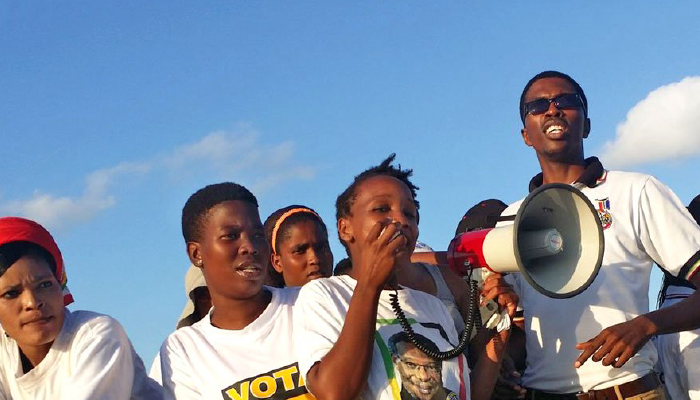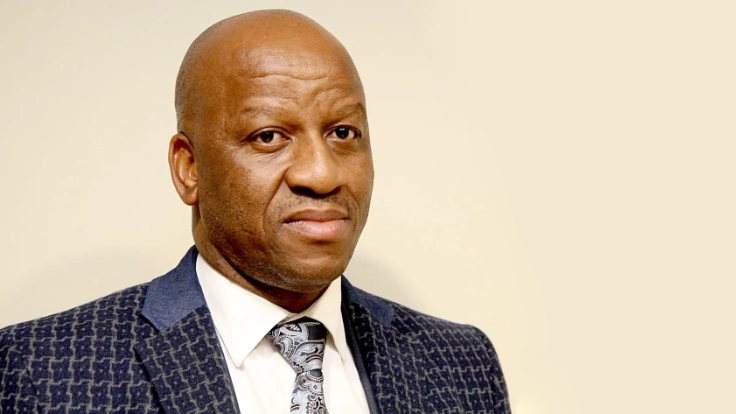IFP YOUTH: STRENGTHENING THE IDEALS OF DEMOCRACY
FOR #SOCIO-ECONOMIC-JUSTICE
ADDRESS BY
PRINCE MANGOSUTHU BUTHELEZI MP
PRESIDENT OF THE INKATHA FREEDOM PARTY
National Chairperson of the IFP Youth Brigade, the Hon. Mr Mkhuleko Hlengwa MP; Deputy Chairperson and Members of the Executive; Leaders of the Party and delegates from all our structures.
As I rise to speak to you this morning, I am conscious of the fact that there are very few opportunities left for me to address the next generation of leaders in a venue like this.
For 44 years we have walked a journey together in the IFP. I have seen young people, from the most rural and unassuming backgrounds, mentored and grow to become outstanding leaders in our nation. I know that the young people before me now are raring to embrace the future, and I wish more than anything that I could live to see who you become in your own lifetime.
I am ready to hand the reins of this Party to the next President. It is not hard to watch this generation moving our Party forward. But it is exceptionally difficult to accept the idea that I won’t get to see the next chapter, or the next, or the next for the IFP. Because I believe this Party is on an upward trajectory. I believe that it holds the potential for a massive resurgence, simply because the values at the heart of the IFP are the values our nation needs.
It is a matter of timing. When the rhetoric is exposed as empty noise; when ears grow tired of unfulfilled promises; when leaders have walked so far in the wrong direction that they have left the people behind; that is when a nation tends to return to fundamental values. It is this that saw the IFP restored to strength in the May 2019 elections. South Africa was ready to leave behind the crippling mess of corruption and weak leadership, and return to fundamental values.
The strength of the IFP has always lain in the fact that our character never changes. We have evolved from being a formidable force against oppression, to being an efficient government, to being a constructive voice of opposition. But throughout
each evolution, the IFP has retained the fundamental principles and values that make us who we are. We have responded to external changes in the political landscape, becoming whatever our country needed most. But we were only able to do that because we knew our own character. The core of the IFP is stable, vital and good.
Our fundamental values have ensured our longevity across massive change, and I believe that our values will take us far into the future of South Africa. This is why I have chosen to speak to you today about the fundamental values of the IFP, because they are the very values of democracy. It is time for us to strengthen our democratic ideals, because in this way, and only in this way, can we achieve social and economic justice.
This has been our clarion call in 2019. Throughout the campaign for the 2019 elections the IFP spoke about social justice and economic justice, and we mapped out a path to create this within our election manifesto. We chose this theme of social and economic justice not because it is new, but because it encapsulates everything the IFP has worked to achieve for more than four decades.
It is, undeniably, time for justice in South Africa. The Fees Must Fall campaign was a cry for justice. The land expropriation debate is a cry for justice. The service delivery protests that are springing up across our country are a cry for justice. Even the rhetoric against “white monopoly capital” is a cry for justice.
The space is wide open in our political landscape for anyone who claims to be able to secure justice. This presents both an opportunity for positive action, and a terrible threat of destruction. Thus it is vitally important for this generation, specifically, to know the truth, to understand the way nations and economies work, and to be able to persuade the conversation back towards democratic ideals.
Let us consider then what those democratic ideals are. A democratic nation believes in the fundamental worth and dignity of every person; it believes that all people are equal before the law and all have equal rights; it believes in the rule of the majority, while protecting minorities; it believes in individual freedom and in limiting government; and it believes in active participation and responsible citizenship.
These are the ideals of democracy, and these ideals express the values of the IFP. So for instance, the ideals of limiting government and enhancing citizen participation are expressed in the IFP’s values of federalism and devolution of powers. The ideal of equality is expressed in our values of inclusivity, unity and Ubuntu botho.
It is important that you know our ideals and values, and why they are immutable, so that you won’t be swept away on the tide of popular philosophy, to the great detriment of our country.
Following the May 2019 elections, the Electoral Commission of South Africa reported that 6 million young people who were eligible to vote, simply didn’t register. And when it came to election day, many young people who were registered to vote failed to visit a voting station. There is a sense that young South Africans have no interest in elections.
This is deeply worrying. I am proud of the youth of the IFP who campaigned so vigorously for May 2019. I am proud of the young people who volunteered to mobilise support, who went from door to door, and who started conversations both online and in the streets about voting for a leadership of integrity. I am also proud of the members of the IFP Youth Brigade who went out on May the 8th and cast your vote. You saw it through. You reached the finish line, and you are our champions.
We need to find ways of mobilising those 6 million unregistered youth, so that they will register to vote in 2021 and in 2024. We need to get them to participate and to cast their vote for the IFP. There is a pool of untapped energy and strength, and we cannot allow it to go stagnant.
I want to commission the IFP Youth Brigade at this Conference to lead the charge in growing the IFP as quickly and as widely as possible. The effort we put into growing this Party ahead of 2019 delivered an election result we can all be proud of. It saw the IFP restored as the Official Opposition in KwaZulu Natal. We knocked the socks off the political pundits, who have been writing our obituary almost since the day the IFP was founded.
But the fact is, we can do better. If we can grow the membership of the IFP at a sustainable, strong pace for the next five years, there is every possibility that the IFP will be restored to the leadership of this Province. If that is what we want to achieve, we need to ignite a campaign of rapid growth.
If we look at a time when the IFP was growing like wildfire, we can learn a valuable lesson. Just two years after its inception, Inkatha had grown to more than a million card-carrying members. Our strategy was grassroots activism. Through our Constitution, we had set in place structures that would enable participation at every level, starting from a local branch all the way up to a national conference. We understood that our strength at the higher levels was wholly dependent on our strength at branch level.
So we focussed on strong and active branches, engaging the youth in development projects and empowering them to take the initiative. We knew that passion must be married to discipline and knowledge if it is to produce something worthwhile. Thus we prioritised formal education. But we also established political classes where young people learned about the various political philosophies and got to grapple with what works and what doesn’t work.
Our youth were activists and our branches were strong. This was a recipe for growth.
I put it to you today that the recipe has not changed. If we want to grow the IFP, quickly and widely, we need to reignite youth activism and focus on strong branches. The space is open to each of you for meaningful participation, because your personal contribution is absolutely vital to the goal we are set to pursue. When it comes to reaching new members and drawing them in, there is no one better equipped than you. With your energy and your contacts, the IFP’s youth can run with this campaign. You can lead our greatest chapter of growth.
In the time ahead we will be able to gauge the success of this campaign through key indicators, long before we reach the next election. One such indicator is the IFP’s strength at tertiary institutions of learning. I must however add that mobilisation of youth has to begin at the level of secondary education. This is why the ruling party’s youth wing is so strong. It is because they commence their mobilisation of COSAS at the level of secondary education.
I think we must be honest with ourselves that something has gone horribly wrong when we look at institutions like Mangosuthu University of Technology and the University of Zululand, and see the SRCs run by the EFF. Where is SADESMO? Why have we allowed it to become minor-league at schools and universities? What went wrong?
I have often said that universities are the seedbed of revolution. Revolutions are not started by the rich, the elite or the elderly. The great revolutions of history have been kindled among the youth. Fundamental ideological shifts have begun from university campuses, where bright young minds have had the courage to question what we know and believe to be true.
This has not changed. Universities are still the seedbed of revolution. But the kind of revolution that is finding fertile ground on campuses across South Africa is not a revolution of goodwill, a revolution to build or unite or create. It is a revolution of destruction, because it is based on a wrong philosophy. The reason the IFP created SADESMO and pushed it to lead in student representative councils is because we wanted the right philosophy to take hold at universities.
I understand why the philosophy of socialism is so popular among the youth. Yours is not the first generation to become enamoured with this idea. When I was at the University of Fort Hare – and we’re talking seventy years ago – the philosophy of socialism was very popular. We all talked about the proletariat and the means of production, and we railed against a system that entrenched poverty.
The ideas of socialism were attractive because they played so well into the setting of political oppression at that time. Socialism was born as a response to oppression which saw the working class deliberately and actively barred from rising above their station, in order to keep wealth in the hands of an elite few. When these ideas are imported into an environment where deliberate, conscious and active oppression is entrenched at the level of government, no matter where in the world, they will easily take root.
Thus, at every point throughout history, since the birth of socialism, it has found ready adherents among students and youth, because there is always a sense of this generation needing to push against invisible barriers imposed by the previous generation.
It was not just at Fort Hare that socialism was popular. Across the board in the liberation movement we embraced these ideas. I remember how awe-struck I was when I visited President Julius Nyerere in Tanzania in the nineteen seventies. President Nyerere was the father of African socialism, or Ujamaa, and we all admired him.
On my first visit, I went to thank President Nyerere for giving sanctuary to all our political exiles. I then visited him again specifically to learn more about African socialism. But I was surprised to discover that, by then, President Nyerere was having second thoughts. He gave me his book called “Ten Years After Arusha”. He had learned the lesson being learned throughout the world, that socialism has failed wherever it was implemented. Not only that, but it has consistently destroyed economies, leaving behind even greater poverty.
Years later, when I was serving as Minister of Home Affairs in the Cabinet of President Nelson Mandela, President Nyerere visited South Africa. Sitting together in my office in Cape Town, he told me that he had been present in Harare at the inauguration of Mr Robert Mugabe as Prime Minister of a free Zimbabwe. He took the opportunity to warn the new Prime Minister, regarding the economy of Zimbabwe, saying, “You have inherited a jewel. Don’t do what I did in Tanzania; don’t destroy it.”
The rest, as they say, is history.
I left behind socialism many years ago, as many of us did. Even President Mandela had changed his mind by the time he became President. Thus we saw promising macro-economic strategies in those early years of democracy, like the Growth, Employment and Redistribution plan, known as GEAR.
Unfortunately, the ANC never quite shook its communist influence through. It is still beholden to its partners in the tripartite alliance; the South African Communist Party and the Congress of Trade Unions. It was COSATU that scuppered GEAR, and years later it was COSATU that declared war against the National Development Plan.
For as long as the ruling Party fails to rid itself of these wrong philosophies and ideologies, the policies it places at the foundation of Government will be flawed. So it remains worrying that the ruling Party is influenced by communism and socialism. But we must also be concerned that these ideologies are being pushed far more openly and vociferously by the red berets, the EFF.
This is why the EFF is popular at tertiary institutions and why it is taking over student representative councils. Because it’s pushing a philosophy that young people are particularly primed to embrace. The problem is, as much as they promise economic freedom, their philosophy leads to broken economies and deeper hardship. This is not an opinion. It is borne out by one example after the next, throughout history.
So what can the IFP do to rescue our economy and save South Africa? What can we do to secure social and economic justice?
We need to recognise that our fight is not against the owners of the means of production. It is not against the haves. We are not oppressed by a regime, but by the circumstances created by limited education, limited resources and lack of development. Our fight is against the system that perpetuates inequality.
It is easy to take all our anger, frustration and despair and focus it on a group of people, or even on a specific family as representative of that group. But that is foolish, dangerous and wrong. It won’t get us anywhere. We need to channel our energy in the right direction, so that it achieves something. We need to fight the system.
We do that by prioritising education, protecting resources and creatively kickstarting development. The problem is the economy. So let’s fix the problem.
I am speaking very deliberately to this Conference of our Youth Brigade, because you are the one that can change the narrative in our nation. You can move this generation away from tragedy, and towards genuine social and economic justice. I want to urge, therefore, as you take up the challenge to grow the IFP, that you become powerful activists for the values and ideals of our Party.
Give young people a better reason to get involved in politics. Give them something that can really change the future, something that will deliver freedom and justice.
Little more than a month from now, I will step down from the presidency of this Party. I have created a legacy and, together with hundreds of thousands of great leaders, I have built a Party that will last well into the future. I think I have earned the right to give a parting instruction to the Youth Brigade of the IFP.
It is this. Revive political education. Draw up a formal strategy and populate it with the right people, in the right places. Make sure it is implemented and make sure it stays strong. We need to see young people taken through the values of the IFP and given a platform to discuss, interrogate, debate and grapple with political issues.
Politics affects everything, from the maintenance of your school sports field to the house you will buy to the quality of medical treatment you’ll receive when you need it the most. We need to talk about these things within the context of ideals and values that can inspire solutions, creativity and hope.
When our branches are meeting regularly and holding robust debates and hearing from leaders, the IFP will grow like never before. And our growth will be a blessing to South Africa, for we will give our country a revolution worth talking about.
Do you know what separates the IFP from every other political party? We truly embody the spirit of Ubuntu botho. Let us remember why we are called Inkatha. Together we are bound as one, serving our purpose to ease the burden of our beloved country.
Today, you in this room will have the responsibility to elect the leadership of the IFP Youth Brigade. Choose carefully. Choose leaders who can lead the charge with wisdom, courage and skill, for the work ahead will define your future.
I thank you.






![IFP Launches Its Plan to Rebuild KZN [English]](https://www.ifp.org.za/wp-content/uploads/2024/04/IFP-Launch-KZN-Plan-to-Rebuild-KZN-Photo-1-1080x675.jpeg)